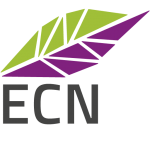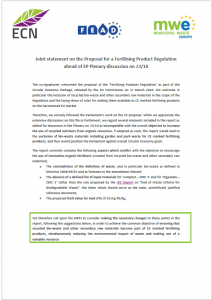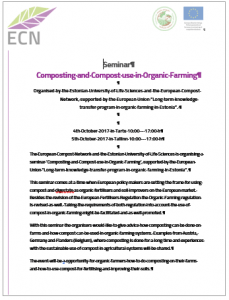EUROPEAN COMPOST NETWORK
ECN e.V.
Network for Organic Resources and Biological Treatment
|
 |
 |
|
Fertilising Product Regulation
ECN/FEAD/MWE Joint statement published
|
|
 Ahead of the European Parliaments Plenary’s 23 October discussion on the CE marked fertilising products proposal, the Parliament has tabled further amendments on the fertilisers file. Several amendments of the Parliament are still incompatible with the overall objective to increase the use of recycled nutrients. Ahead of the European Parliaments Plenary’s 23 October discussion on the CE marked fertilising products proposal, the Parliament has tabled further amendments on the fertilisers file. Several amendments of the Parliament are still incompatible with the overall objective to increase the use of recycled nutrients.
Therefore, the European Compost Network (ECN), the European Federation of Waste Management and Environmental Services (FEAD) and Municipal Waste Europe (MWE) have co-signed a joint statement on the most controversial aspects for the recycling of biowaste into high value fertilising products:
- The contradiction of the definition of waste;
- The absence of a defined list of input materials for compost and digestate;
- The proposed limit value for lead (Pb) of 20 mg Pb/kg.
If adopted as such, the report would lead to the exclusion of bio-waste materials for CE marked fertilising products, and thus would position the Parliament against overall Circular Economy goals.
The signatories therefore call upon the MEPs to consider making the necessary changes to these aspects in the report, in order to fulfil the shared objective of ensuring recycled bio-waste and other secondary raw materials will be part of CE fertilising products.
After the final vote on the Parliament’s report in October it is likely that the inter-institutional discussion between the Commission, the Council and the Parliament will start.
Technical proposal on End-of-Waste criteria for Compost and Digestate should be respected.
With regard, to the Commission’s proposal, some aspects, like setting up specified input lists for the component material categories and adequate time-temperature requirements for producing compost and digestate, have to be reconsidered.
The European Compost Network stresses again that harmonised and reliable criteria for compost and digestate, which will be placed as organic fertilisers and soil improvers on the European market should be set. These should be based on the technical proposal on end-of-waste criteria for compost and digestate, worked out by the Joint Research Institute ‘IPTS’ of the European Commission.
For following the discussion in the Council and with regard to the expected inter-institutional negotiations the European Compost Network has therefore published an updated position paper.

|
ANNOUNCEMENTS
4-5 October 2017, Tartu/Tallinn (EE)
Composting and Compost use in Organic Farming
|
|
The European Compost Network and the Estonian University of Life Sciences is organising a seminar ‘Composting and Compost use in Organic Farming’, supported by the European Union “Long term knowledge transfer program in organic farming on 4-5 October 2017 in Estonia”.
 This seminar comes at a time when European policy makers are setting the frame for using compost and digestate as organic fertilisers and soil improvers on the European market. Besides the revision of the European Fertilisers Regulation, the Organic Farming Regulation is revised as well. Taking the requirements of both regulation into account the use of compost in organic farming might be facilitated and as well promoted. This seminar comes at a time when European policy makers are setting the frame for using compost and digestate as organic fertilisers and soil improvers on the European market. Besides the revision of the European Fertilisers Regulation, the Organic Farming Regulation is revised as well. Taking the requirements of both regulation into account the use of compost in organic farming might be facilitated and as well promoted.
With this seminar the organisers would like to give advice how composting can be done on farms and how compost can be used in organic farming systems. Examples from Austria, Germany and Flanders (Belgium), where composting is done for a long time and experiences with the sustainable use of compost in agricultural systems will be shared.
The event will be an opportunity for organic farmers how to do composting on their farms and how to use compost for fertilising and improving their soils.
The final programme can be accessed here.
ECN Info Paper
Sustainable Compost Application in Agriculture - English Version of the Summary Report
ECN has redesigned the English version of the Summary Report of a scientific study conducted from 1995 to 2008 examining the influence of compost application in long-term field trials.
The project was managed by the Center for Agricultural Technology Augustenberg (LTZ) of the Ministry for Food and Rural Areas (Ministeriums für Ernährung und Ländlichen Raum Baden-Württemberg) Germany in cooperation with Helmholtz Centre for Environmental Research - UFZ, Department of Soil Ecology, Halle; Bioplan Dr. Reinhold and Dr. Müller GmbH, Klein Machnow.
The project was supported by Ministry for Food and Rural Areas (Ministerium für Ernährung und Ländlichen Raum) Baden-Württemberg and German Compost and Humus Organisations: Bundesgütegemeinschaft Kompost e.V., Köln, Gütegemeinschaften Kompost Region Süd und Region Südost, Verband der Humus- und Erdenwirtschaft (VHE) und Verband der Humus- und Erdenwirtschaft Nord.
The new designed Info-paper is available here.

|
12-13 October 2017, Linz (AT)
Experience Exchange Day on Composting
|
|
This year's Experience Exchange Day (Erfahrungsaustausch Kompost) provides latest information and updates on composting. Efforts to collect biowaste and biowaste management in Linz and Upper Austria will be discussed and open questions on the approval of composting plants are examined.
In several lectures (in German language), the future of sewage sludge utilization in Austria and Europe will be discussed and the Federal Waste Management Plan 2017 and current discussions at EU level will be examined in this context. ECN will present the latest developments in the policy debate on the Waste and Fertilser Proposals. Information on the newly established Compost and Biogas Association Austria (KBVÖ) and the activities of the ÖWAV as well as an excursion to the extended facility of Huemer Kompost GmbH round off the ERFA compost 2017.
Further information can be accessed here.

16 -17 October 2017, Poznan (PL)
Envicon - International Congress of Environmental Protection
|
|
For years this congress brings together experts from industry, business representatives, municipal companies operating in that area. Many representatives of central and local government and scientists are present at this event. During the two days of the congress held several sessions covering the most important topics of environmental protection. For several sessions translation in English is provided.
Further information on the ENVICON can be accessed here.

|
17 October 2017, Hamburg (DE)
Closing the loop – Challenges for the future of food waste valorisation
|
|
The Hamburg University of Technology (TUHH) and Energy net Hamburg (ENH) will be carrying out an event with the topic “Closing the loop – Challenges for the future of food waste valorisation”
It is part of the European Unions’ Horizon 2020 project DECISIVE (A decentralised management scheme for innovative valorisation of urban waste). Presentations will be held about food waste including avoidance and valorisation options, followed by a round table discussion and get-together lunch for further discussions.
The participation is FREE of charge, but LIMITED in the number of participants.
Further information can be accessed here.
|
|
|
|
|
|
|